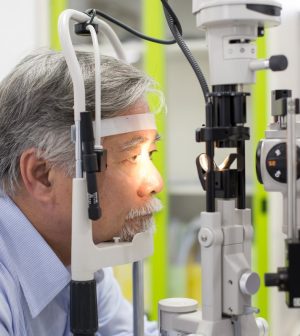- Could Your Grocery Store Meat Be Causing Recurring UTIs?
- Are You Making This Expensive Thermostat Error This Winter?
- Recognizing the Signs of Hypothyroidism
- 10 Strategies to Overcome Insomnia
- Could Artificial Sweeteners Be Aging the Brain Faster?
- Techniques for Soothing Your Nervous System
- Does the Water in Your House Smell Funny? Here’s Why
- Can a Daily Dose of Apple Cider Vinegar Actually Aid Weight Loss?
- 6 Health Beverages That Can Actually Spike Your Blood Sugar
- Treatment Options for Social Anxiety Disorder
Cholesterol Med Might Slow Vision Loss in People With Diabetes

A well-established cholesterol-lowering drug appears to significantly slow the progression of a diabetes-related eye disease, a new trial shows.
Fenofibrate (Tricor) has been approved since 2004 as a means of lowering cholesterol. Now, this new study shows that fenofibrate also can reduce the progression of diabetic retinopathy by 27% compared to placebo.
The findings were published June 21 in the journal NEJM Evidence and presented simultaneously at the American Diabetes Association’s annual meeting in Orlando, Fla.
“Diabetic retinopathy remains a leading cause of visual loss and we need simple strategies that can be widely used to reduce the progression of diabetic eye disease,” said researcher David Preiss, an associate professor at Oxford Population Health in the UK.
The results from the new trial “suggest that fenofibrate may provide a valuable addition to treat people with diabetic retinopathy,” Preiss added in a meeting news release.
Diabetic retinopathy occurs when elevated blood sugar levels damage blood vessels in the back of the eye. The vessels start to swell and leak, eventually leading to blurry vision, blank spots and blindness.
For this study, researchers recruited 1,151 adults in Scotland who had developed early diabetic retinopathy or macular degeneration. They were randomly assigned to take either fenofibrate tablets or a placebo.
Over four years, nearly 23% of people taking fenofibrate had their eye disease worsen, compared with 29% on a placebo, results show.
Fenofibrate also cut the risk of developing macular edema, which is a potentially harmful swelling in the retina.
Participants’ progress will continue to be tracked, to better understand the long-term effects of fenofibrate on health, researchers said.
More information
The National Eye Institute has more on diabetic retinopathy.
SOURCE: American Diabetes Association, news release, June 21, 2024
Source: HealthDay
Copyright © 2026 HealthDay. All rights reserved.










